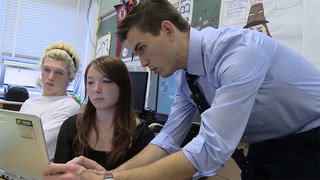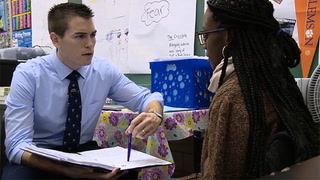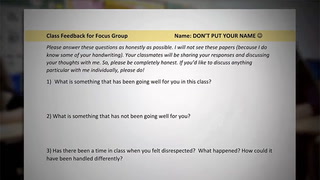Getting Better Through Authentic Feedback Transcript
Speaker 1: I want to say thank you first of all for one, showing leadership. Today what we're going to see is a student-led focus group that's going to give me feedback on our class and my instruction and how I can better meet the needs of students.
Speaker 2: In our group, the main focus was time management.
Speaker 3: They're really scared to do the presentations.
Speaker 4: They love that you're honest and like how you push us.
Speaker 2: A lot of people were saying that we don't really get a positive feedback, I guess.
Speaker 1: I set this up because I have always grown, I think almost the most as a teacher because of the feedback students have given me. They're with me on hundred and eighty days of the year.
Speaker 1: Remember that we're trying to be solutions-oriented, right? So, here's the challenge, let's focus on how we can get better.
Speaker 1: So I knew I had an upcoming absence from class. So I asked for volunteers from each class to lead focus groups and told them that I was going to every student a half-sheet, to kind of get their ideas going. But, I wanted these students to kind of call together information that would give me feedback in a way that students could feel like they could be completely honest, because it was going to come to me through these filters of these other students.
Speaker 1: Is there anything else that's big on not going well?
Speaker 5: People have been saying that they don't like writing essays. And I'm like, well, you've got to write essays. Sorry, guys.
Speaker 1: Was there anything, kind of more specific?
Speaker 5: Yeah, and ...
Speaker 1: There were some pretty particular questions about how they feel in general, how the kind of subjective experiences of the classroom had been going for them. But also, particular about their progress in learning and where they feel like they are making progress and they're feeling a sense of efficacy as a learner.
Speaker 6: Everybody that I talked to was more focused on the fact that there was two essays about almost the same topic.
Speaker 1: What I'm hearing, and tell me if I'm hearing it correctly is that people were supported but we need variety, is that fair?
Speaker 7: When we did the socratic seminars, me personally as a co-pilot, I felt like I couldn't jump in. Or, there wasn't times where I had the opportunity to jump in.
Speaker 1: Would you prefer a co-pilot who gets in more often?
Speaker 1: This is different than a survey, which is just a one-way conversation where I'm just receiving feedback. And I found so many times that I have so many questions. About, well, what did you mean here? Or what could I do differently?
Speaker 7: Like, if we told them that we could jump in, maybe that would work better?
Speaker 1: And in this format, I'm able to have that conversation with some of those students, and we're having it together.
Speaker 9: Most of the time when we have written pieces or things that would take a while, it's kind of hard for us to remember when to turn it in, or when it's due.
Speaker 1: And there are times when I am truly stuck on what to do differently, and sometimes the students fill that need with a great idea that I wouldn't have thought of on my own. And so, I get a better sense of what's happening in the classroom that I might not be picking up on.
Speaker 1: I'm open for ideas.
Speaker 10: Like, have a half-sheet or something that has different dates.
Speaker 1: Okay, that's actually a good thought, because we have a bunch of different assignments going on right now with the workshop.
Speaker 11: When we used to have debates about The Kiterunner, I feel like someone would shut down someone else's point and then they'd be sad for the rest of the day.
Speaker 12: And along with that, certain people said that other people push their opinions on to somebody else.
Speaker 1: One general surprise was how often they were able to point to specific instances that happened a month and a half, two months ago, and they remembered as clear as it was yesterday. And a reminder that kids really are always paying attention.
Speaker 12: She felt like her opinion was wrong.
Speaker 1: Oh, so her position was abandon by others?
Speaker 12: Yeah.
Speaker 1: And that made her feel ... Okay. So I should just be sensitive on how we manage those conversations a little bit? Okay.
Speaker 1: Hearing back from these students in this way helps me be aware, and gives the students a forum to air that grievance, and to feel like it was heard, which I think is important too, for kids. To feel like they are able to share those challenges.
Speaker 1: So we're hearing from some people that they need the positive feedback and the encouragement, but some of you at least here are saying that there is balance?
Speaker 1: I think I'm going to do this quarterly, and giving different students the opportunity to be the leader and be the filter and share that voice though the focus group with me.
Speaker 13: You say what we need to improve on, but you also tell us what we did good. So, maybe it's like specific to certain people ...
Speaker 15: In my personal opinion, I have noticed for me I try really hard, and I don't see myself as a really good writer. So, a lot of the feedback I receive is constructive, but not a lot of positivity. Like the Tragic Hero essays. It was like hit after hit after hit.
Speaker 1: Oh, I'm sorry. So that's a tough balance for me, because my job is to try to move your writing forward. Right, for everyone? I do know that part of moving forward is wanting to move forward because you've received positive feedback. And that's actually where I'm trying to use that highlighting strategy. And that helps me because if I notice there's nothing green, highlighted green, I'm like uh oh, I better go back and find some green.
Speaker 1: I would love to get a little bit of the good before we have to break it up.
Speaker 16: They like how fast you react to things and how ...
Speaker 1: I think that this strategy calls on me, as the adult, to have the courage to be vulnerable, and to say to them, "This might be hard for me to hear, but I need to hear it."
Speaker 1: With two or three people, just share the summary that you came up with from reading that article.
Speaker 1: I can't change how they feel, but I can change how I react to those feelings, and how I try to help them move past time, or mitigate them, and help them move to a place where they're ready to put in full effort and feel like we're in a partnership for their success.














40 Comments
Irewande Kolawole Mar 14, 2022 2:03pm
good
Michael Stires Jun 18, 2020 4:47pm
Vulnerable students create a foundation of trust with the teacher to be able to open up and give valuable feedback because its hard for a teacher to hear students criticism. Expressing how they feel and the teacher making it aware that he cannot change their feelings, but he can change based on the reactions and how he can tailor towards their feelings. Building leadership skills starts from within and finding the right tools to mold learning was expressed wonderfully through this video. The teacher created focus groups to provide feedback from students to have them explain their reasoning when the question “why or why not” is asked. Creating those communication skills amongst students improves their leadership ability to grow and critically think about the assignment.
Karen Kungie-Torres May 26, 2018 11:51pm
Regina Johnson May 26, 2018 12:24pm
Nichole Greco Dec 5, 2018 11:51am
Hey Regina,
I had the same question too, and found the document under the link "supporting materials" . Hope things went great of you when you tried this strategy!
David Jackson May 26, 2018 12:16pm